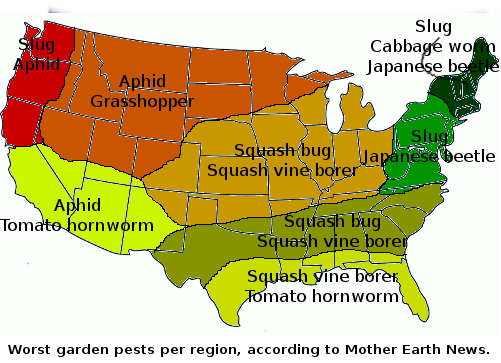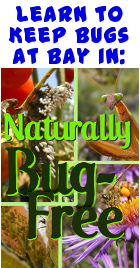
Calling permaculture insect-control techniques


I started working on an ebook about garden ecology...and it turned into a
book about dealing with invertebrate pests in the garden. Rather
than focusing on mainstream, organic solutions like Bt and row covers,
I'm writing about what we do in our own garden --- attracting beneficial
insects and larger predators, hand-picking, and so forth.
And as I wrote, I
realized that some of our readers may have excellent permaculture
techniques of their own to keep slugs and bugs from demolishing their
fruits and vegetables. If you're interested in being featured in Bug Theory for Gardeners, please leave a comment below or email anna@kitenet.net
with your problem and solution. I'm less interested in
commonly-used techniques like beer traps for slugs, and more interested
in options like variety selection, ducks in the garden, and other
low-work and chemical-free ways of keeping the pests at bay.
To sweeten the pot, I'll include your URL in the ebook when I give you credit (if you want), and will mail you a copy of either The Weekend Homesteader, Watermelon Summer, or our 2014 calendar
(your choice) if I use your tip. I'm most likely to use a tip if
it comes with a photo attached, but feel free to submit picture-less
first-hand experiences as well.
I'm looking forward to hearing what you've come up with!
Want more in-depth information? Browse through our books.
Or explore more posts by date or by subject.
About us: Anna Hess and Mark Hamilton spent over a decade living self-sufficiently in the mountains of Virginia before moving north to start over from scratch in the foothills of Ohio. They've experimented with permaculture, no-till gardening, trailersteading, home-based microbusinesses and much more, writing about their adventures in both blogs and books.
Want to be notified when new comments are posted on this page? Click on the RSS button after you add a comment to subscribe to the comment feed, or simply check the box beside "email replies to me" while writing your comment.

Hi Anna and all,
How about a chapter about plant nutrition (mineral balance). See for example Jerry Burnetti's latest article in AcresUSA about his experience with mineral balance and butternut squash.
I have heard so many give lip service to balanced soil and nutrient dense crops and then talk about how they poison or otherwise kill their pests. I guess it never occurs to them that their produce might be made much better to eat and resist most pests at the same time? I am not sure where the disconnect is? It seems they can't connect these ideas together?
Anyways, we are eating apples which grew pest free on a tree in a public area! 'The only thing unique that I could identify was a lot of bark mulch near that tree. I really should do a test on the soil near that tree! Maybe someday....
All the farmers around here (NH) 'know' that it is impossible to raise apples without chemicals.
However, that has not been my experience.
So as Anna would say: Please share your experience!!!!!! What worked for you? How well, etc.
John
For my mom's (very tiny) garden we tried to get her a few bird and bat houses. Then she stopped gardening so I have no idea if it would've been effective.
I've considered "borrowing" her yard and putting in my own garden, (and she said she'd be happy to let me) but I don't trust her to watch over it the way I would. She would water every day and sprinkle all sorts of poisons on it the way she did hers. I've tried to break her of her bad habits, but she won't listen.
Below are some techniques we use.
We had tomato hornworms the past few years, but not very many and they usually got removed by hand and fed to the chickens. This year I found one that had been parasitized by wasps so I left it so they could hatch and control any others in the area. http://www.flickr.com/photos/20378685@N00/9758885184/in/photolist-fSmQz7-9Vbxwx
We also put out mason bee blocks and some wet mud near the entrance and left them out all season. When we went to harvest the bees we found Mud Daubers also laid eggs in some of the unused cells. They collect food for their young inside the cell before they cap it with mud. I found one cell that was filled with caterpillars and a dauber larvae and another cell with a pupae of the mud dauber and just bug parts left over. http://www.flickr.com/photos/20378685@N00/10280937096/in/set-72157632508720226 http://www.flickr.com/photos/20378685@N00/10280965835/in/set-72157632508720226
We also saw a few cicada killer wasps this season that were taking cicadas right out of the air. The cicada grubs can cause minor damage to roots, and more severe damage to young fruit tree branches. http://www.flickr.com/photos/20378685@N00/9573173902/ http://www.flickr.com/photos/20378685@N00/9570378509/ http://www.flickr.com/photos/20378685@N00/6589148165/in/photolist-b3g7bR
We have a small home made tube style bird feeder as well as cavity nesting style bird houses in the backyard that attracted woodpeckers to our yard initially but they later found the borers in our apple tree and removed all they could find. http://www.flickr.com/photos/20378685@N00/9176358968/in/set-72157632508720226 http://www.flickr.com/photos/20378685@N00/10513146345/in/set-72157632508720226
We have a lot of bachelor buttons and these attract a lot of lady bugs early in the season before a lot of the more common flowers start blooming. They also self seed each year. Lady bugs make more lady bugs and their larvae eat a lot of aphids too. http://www.flickr.com/photos/20378685@N00/8649545130/in/set-72157632508720226 http://www.flickr.com/photos/20378685@N00/8719269466/in/set-72157632508720226
We built a wildlife pond to attract birds and dragon flies. The dragonflies and their larvae eat a lot of mosquitoes throughout the season. http://www.flickr.com/photos/20378685@N00/8857436348/
Our chickens are also find a lot of bugs around the yard which may reduce populations of some bad insects but we don't usually let them into the garden.
http://www.flickr.com/photos/20378685@N00/10769969093/in/set-72157632508720226
Hopefully some of the information and photos I shared can help you finish your e-book.
Flickr has changed their layout so if you need any larger versions of the photo click the 3 dots in the lower right then click view all sizes. Feel free to crop any photos you need or edit anything I've written to fit your book.
Good luck!
John --- That's definitely been on my list. I have a bit from firsthand experience to report in that line, but am also glad for the lead for further research.
Emily --- It's tough to garden with someone who has very different beliefs from you.
Brian --- Thanks so much for such a great comment! I'll definitely use some of that in the book. What would you like to win --- calendar, Watermelon Summer, or Weekend Homesteader? I'm pretty sure you already have the last....
We have Saxony and mixed breed ducks. They are very destructive in the veg garden. We fence them out of the veg garden completely. They are fine in the perennial beds and yard and we love them for cicada and Japanese beetle control in those areas.
I'm afraid I don't have any great tips to offer with regard to insect control in the veg garden. I hand pick squash bugs and eggs, blister beetles, hornworms and flea beetles [when I'm fast enough to catch them]. I'd love to know how to get rid of cucumber beetles, which fly away as soon as we make eye contact. I have had some varieties of squash survive the borers, but even that depends on the year. [Pattypan Golden Marbre, Lemon squash, and Greek Sweet Red squash are pretty tough some years.] I hope you get some great tips from your other readers.
I went to a lecture by these dynamic guys last year at the Southern Sustainable Ag Working Group (SSAWG) conference and they got me more interested in bugs and their interactions than I had been before. http://www.drmcbug.com/
They also have videos available to watch online: http://www.livingwebfarms.org/#/workshop-videos/4560000647
Anna,
I don't have any ducks yet, I've done a bit of research on them over the years and will be looking to getting a few in the future. Here is a good link that provides some very good first hand experience with Indian Runners (http://permaculturenews.org/2013/02/05/a-complete-guide-to-using-slugs-as-a-resource-with-indian-runner-ducks/). Most ducks are an issue in the garden but Indian Runners aren't the same, they only are interested in insects mainly.
Everybody --- Keep those tips coming!
Jackie --- I love your firsthand experience and would like to use it in the book. Do you have any photos of your salamander and toad habitat in action? If so, drop me an email and I'll trade you one of the book or calendar prizes for it.